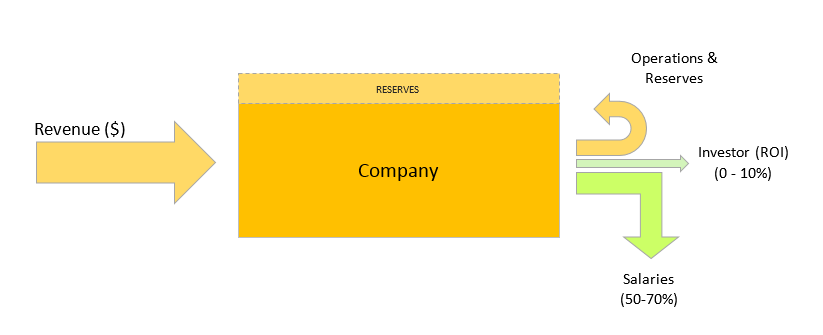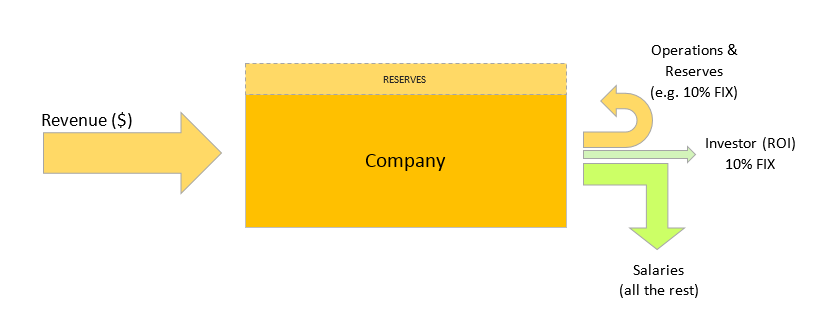Agile organization
In any knowledge-based organization, it is employees, who have power over value stream. Imagine your any project. Who did planning, estimations or execution? Did we seriously think when preparing plans? Did we considered our failures as opportunity to learn? If project goes well, no problem. But if it fails, in many cases and organizations, it is still just minor problem! And if it fails regularly, there is strong attempt to solve the problem with deployment of different methodology. However, most project failures I saw were related to knowledge people – they simply did not care. If lack of care is the reason for project failure, then who should pay salary? Do you pay at home your plumber, if he fails to connect your water pipe? No matter he will claim he did his best and deserves the pay. I do not remember, when I saw the situation people who screwed up software project did not get paid.
Agile organization is built around the people and around values. Employees at low ranks are those being in contact with customer and designing and executing the work. They do most of decision as they have first-hand information to do so and they are accountable for the outcome. Managers are rather enablers than controllers and commanders here.
Who owns Black Peter?
Let’s imagine organization. In traditional configuration, money flow regularly in. If projects goes well, we do not have problem. Part of the money goes to salaries, typically the biggest part. Rest remains for investor, organization development and reserves. If inflow is smaller, same fixed part goes to salaries, there is no rest for investors and not much remains to evolve business further. If inflow is further reduced, there is still same fixed part for salaries, and nothing for investor and nothing for evolution. Then reserves are shrinking. So the risk is at organization.

However, who is the organization? In most companies I have ever witnessed, there is general believe, that organization are managers. Managers are believed to act on behalf of interests of organization. In most cases, however, I see completely different scenario. Managers act as employees. They defend their own interests regardless of company interests. They also in some cases apply strategies to maximize their private revenue stream. I met only handful of managers who really stands on behalf of the organization. There is typically nobody on behalf of organization there. That is why organization cannot defend itself, it is not human being. That is why, if things are going badly, people start escaping. Those, who have information are among first, so best people and managers are often in first wave. Then it collapse all down and the last one usually lose everything – the investor. Unless he/she starts very painful recovery.
What do I propose then? Value based salary and remuneration!
As illustrated in previous example, it is nonsense to expect, that people who can influence the case, will act. How about to redefine the roles? In knowledge based business we are not employees anymore. We all become intrapreneurs and partners regardless the type of the contract we have. We use our knowledge and expertise in collaborative work to create value, and that value created is later being used for salaries or remuneration. So we are not remunerated for work, as Christof Braun pretends in his presentation, but we are remunerated for value created. This is the paradigm shift.
Let’s redefine principle for remuneration. Let’s sum all the money (value) that entered the company. Let’s deduct e.g. 10% from it to investors – guaranteed fix. (Or set this fix for any appropriate level.) Then let’s deduct another portion for company evolution. This will give us guarantee, we will invest into future and evolve – kind of securitization of job for the future. Pay for salaries the rest. If nothing will left, then salary will be zero. I doubt it will ever happen.
Alternatively, set up threshold, what minimal value created must be to cover salaries in full. If threshold is not reached, salary will be reduced proportionally. If nothing was created, salary will be zero.
In both cases, salary is variable. It reflects the true value created and interests of all parties are guaranteed. As value created will not be the same from month to month. And it is also fair. If more value is created, more money can be paid. How to create more value? By utilization of creative potential of the people. Some of you may argue, that in case of little value was created there is penalization there. And we wanted to avoid it. To my defense, it is not. If value is not created, then the entity, which can’t defend itself or which can’t influence results will not get punished. It will put people accountable, those who can influence the result. Again, not as a punishment, but as just a sharing output. Utopia? Ask any small business person or your parents running their Mama&Papa shop, who pays the salary if low value was created.
In this system I can see benefits. In everyday practice I can see failures of companies because of people’s negligence, lack of responsibility, pursuing own interests, lack of professional knowledge and incompetence, laziness, or many others, which all results in poor performance of the companies. With direct value based remuneration most of these issues will just disappear.
The value here is easy to be measured. I can’t see any reason, why appraisals should be abolished, as Luis Gonçalves prays, if they are transparently calculated, value related and team based. I think, it will not resolve every problems. However, I think that maximization of salary through maximization of value will be good direction then.
Switching to value based remuneration will be challenging task for organization, requesting clear vision and strategy. So far I believe, it is doable.
About author: Michal Vallo helps managers to understand agile techniques, benefit from its adoption to their organizations and consequently radically improve organizational overall performance. He is principal, agile trainer, coach and manager at Aguarra, founding member of Agilia community and organizer of Agilia Conference in Brno and Agilia Budapest Conference.


The transparent calculation is the trick here. At first it seem impossible to me to introduce some value distribution ratios, but isn’t it what we do by fixing salaries for different roles? On the other hand I can hardly imagine, how to make it across the teams. Happy to be challenged on that though ;)